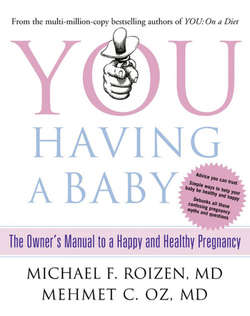Читать книгу You: Having a Baby: The Owner’s Manual to a Happy and Healthy Pregnancy - Michael Roizen F. - Страница 44
Immunity Granted
ОглавлениеAs we get older, we tend to think of lymph nodes only when they get sore or swollen, but they actually play an important role in fetal immunity. After T cells mature in the thymus, they engage the enemy on the biological battleground: the five hundred to six hundred peripheral lymph nodes distributed throughout the body. Once T cells have recognized the enemy, they head into the spleen, where B cells are made. The thymus doesn’t change its responsiveness after birth, but the lymph nodes and spleen change big-time. In the fetus, about a quarter of the T cells in the lymph nodes and spleen are regulatory, meaning that their job is to prevent a child’s immune system from overresponding.
Why would this happen? Immune cells from the mother that slip through the placenta into the child’s body will be sequestered in the lymph nodes. After all, that’s where infections collect as you grow up and overcome, for example, a sore throat and get large, tender lymph nodes in the local neck area. By not overresponding to the mother’s immune cells, the fetus develops tolerance. In other words, the mother’s immune cells are instructing the fetal cells to tolerate their presence. This parental guidance might not work in teenagers but works like a charm in the womb. These insights are helping scientists figure out how to perform safer transplantations so that patients do not reject the donated organs.
placenta. This is called passive immunity because the fetus doesn’t make antibodies itself but accepts the mother’s. Interestingly, it even turns out that some cells from mom slip through the placenta to teach the baby’s cells how to tolerate foreign antigens—diplomatic cells, if you will.
This transmission of antibodies serves two roles: protecting the fetus and signaling to the mother that this foreign tissue has cleared inspection and can be safely allowed to park its behind in her uterus for the greater part of the next year. Now, a fetus’s immune system doesn’t start developing on its own until nine weeks and isn’t up and running until week fourteen. The reason for that delay is to help the fetus to tolerate mom—after all, the fetus is 50 percent dad. If its immunity was fully developed from the get-go, there’d be the chance that the fetus might identify mom as different and reject its host.
The fetus’s first line of self-defense is a primitive form of immunity called toll-like receptors (TLRs). They work a bit like an alarm system, recognizing cells as evil or friendly and then alerting other immune cells (namely, T cells and B cells, also known as T lymphocytes and B lymphocytes) to do the dirty work. By the end of the first trimester, B lymphocytes are produced in the fetal liver, while T lymphocytes develop in the thymus—a gland in the chest that is large in babies but small in adults.* By this time, the fetus is much better able to withstand sophisticated invaders and potential threats than it was when just the TLRs were in place. Along with the timing of the fetus’s major organ development, the fact that the fetal immune system isn’t fully functional until the second trimester is why you have to be especially careful about exposure to toxins and infectious agents during your first trimester.
T cells work by looking for bad guys in the body and creating memories of any potential invaders they encounter, such as bacteria, viruses, or parasites. It’s a biological Most Wanted List of sorts. The T cells act as the captains and generals of the fetal immune-system army, deciding how many immune cells will respond to potential threats and ensuring that the body doesn’t over- or underrespond. B cells serve as the privates, waiting for a signal to tell them whether the invader is a good guy or a bad guy. Once they know it’s a bad guy, they start making antibodies and blasting away.
Recent research shows that the fetus’s cells and the mother’s immune system join forces to fight infections and other common enemies. When the fetus’s cells call for help, the mother’s system responds to the TLR alarm and sends reinforcements throughout pregnancy.†
So, in many ways, the placenta is the unsung hero of pregnancy, dutifully providing your baby with nutrients and immunity. That’s not to say it couldn’t benefit from a bit of attention. If you do right by your placenta, it’ll do right by your child—with potentially lifelong effects.
